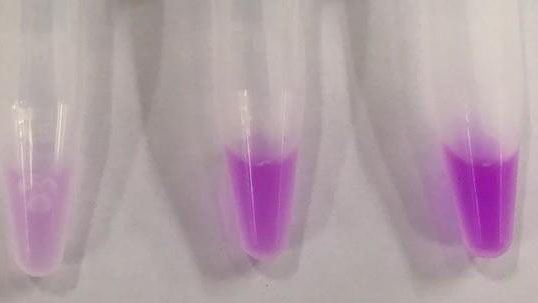Cambridge Analytical Biotechnology
Professor Lisa Hall

Group leader: Professor Lisa Hall
Professor Lisa Hall CBE is Professor of Analytical Biotechnology. She was the first female professor of Queens' College and in 2013, was appointed Vice-President, serving until 2018. From 2010 - 2018 Hall served as the Deputy Head (Research) at the Department of Chemical Engineering and Biotechnology. She was Head of Department from 2018 - 2020. In 2023, she was awarded the MRC Millennium Medal, in recognition of her pioneering multidisciplinary work and key translational impacts in biotechnology and biosensor design.
Professor Lisa Hall
Professor Lisa Hall
About Cambridge Analytical Biotechnology
Cambridge Analytical Biotechnology (CAB) has a special interest in in-vitro diagnostics: the understanding of how biology can be interfaced with electronic, mechanical and optical systems and the development of new instrumentation and techniques to answer fundamental and applied questions concerning new biological measurement regimes and conquering challenges concerned with analysis and diagnosis with bioelectronics.
The unique CAB approach is characterised by end-to-end analytical systems from dynamics of molecular signalling to transduction technologies and application; this requires interdisciplinarity, adopting methods from biotechnology, engineering and chemistry. The group has a world-class reputation for its lead in applied innovative research, bridging theoretical methods and modelling with lab-based experimental science.
The research project base is designed to achieve a necessary balance between fundamental investigation (blue skies research) and precompetitive application-orientated collaboration with industry. Industrially sponsored research is organised to achieve a truly collaborative format, with active input from all partners and 2-way exchange of expertise, intellectual and commercial invention and development.
CAB also has a special interest in improving access to diagnostics in low and middle income countries (LMICs) without global purchasing price parity across borders. Partnering with colleagues in LMICs the group is using synthetic biology techniques to develop local integrated diagnostic manufacturing and designing affordable local production and testing without a cold chain.
CAB also has a special interest in improving access to diagnostics in low and middle income countries (LMICs) without global purchasing price parity across borders.
Research areas
Protein engineering for sensors and bioelectronics
Even though protein based biosensors have been successfully developed, they have typically used naturally occurring enzymes that have not evolved for the purpose of being used in a biosensor. Similarly, the hunt for naturally occurring bioelectronic components does not reveal structures optimised for assembly and deployment in circuitry. A powerful tool currently being used to expand the family of biomaterials and integrate them with transduction elements is protein engineering.
Starting from the basic concept that a biosensor for in vivo diagnostics requires an analyte biorecognition element, for example an enzyme, antibody or other binding protein, biosensor design begins with that element. The vision converges towards modular molecular-engineering in which integrated signal transduction function and binding site characteristics are engineered in tandem with self-assembling nanostructures or modular self-immobilising peptide sequences. These design principles have allowed protein isolation without many of the normal downstream steps and avoiding chemical modification, while achieving stabilisation of the proteins without such stringent cold chain needs.
Protein engineering allows both structure and function to be embedded into a fusion protein and optimised to become a novel bioanalytical component. For example, a construct of an enzyme or antibody with honeybee silk protein appended with fluorescent protein can be expressed in E. coli and spun to fibres which can be fashioned into swabs and included in a design for a self-indicating in vitro diagnostic.
Our ‘gene to diagnostic’ programme takes an approach to materials that can be expressed in vivo in E. coli with one step purification and silica biosensor integration and can be produced with minimal resources at low cost. A fusion protein construct combines A) the central functional assay protein (e.g. enzyme); B) a visualizing protein (e.g. fluorescent protein) to provide a reference measurement in the final diagnostic and facilitating visual monitoring of the production and isolation without a laboratory infrastructure; C) an in-built immobilization peptide which is fundamental to stabilization and effective interfacing with (i) the sample (ii) the diagnostic platform and importantly (iii) plays a key role in simplifying isolation and purification. Depending on the choice of peptide, different platform substrate materials can be chosen (e.g. paper, silica, metals, carbon etc.).
Using synthetic biology we have also used properties of energy transfer to design a self referencing firefly luciferase enzyme which measures ATP and taking into account the distance between the redox site and the electrode have engineered redox proteins to allow direct electron transfer between protein and electrode. Hybrid protein-redox polymer structures have been achieved whose oxidation state and charge storage can be controlled by electrode polarisation voltage.
Schematic Illustration of Gene to Diagnostic Pathway:(1) Protein engineering to obtain R5-mCherry-Enz fusion protein(2) Bacterial culture growth(3) Protein expression(4) Addition of silica (extracted from sand) to crude lysate(5) Protein purification/immobilization/stabilization on silica(6) Isolation of silica-R5-mCh-Enz(7) Direct use of the silica-R5-mCh-Enz in biosensor platforms for the detection of sarcosine in a novel hourglass biosensor design. Image Source: Gene to Diagnostic (Biomaterials 2019)
Schematic Illustration of Gene to Diagnostic Pathway:(1) Protein engineering to obtain R5-mCherry-Enz fusion protein(2) Bacterial culture growth(3) Protein expression(4) Addition of silica (extracted from sand) to crude lysate(5) Protein purification/immobilization/stabilization on silica(6) Isolation of silica-R5-mCh-Enz(7) Direct use of the silica-R5-mCh-Enz in biosensor platforms for the detection of sarcosine in a novel hourglass biosensor design. Image Source: Gene to Diagnostic (Biomaterials 2019)
AfriDx Diagnostic Project
AfriDx is an initiative to develop systems for the clinical diagnosis of Covid-19 designed to be manufactured in low and middle-income countries.
AfriDx is a consortium of partners based in Europe and Africa to create a solution for locally manufactured Covid-19 diagnostic systems. Our partners include the Danish Technical University, Avoma Group (PTY) Ltd, Noguchi Memorial Institute for Medical Research, Kumasi Centre for Collaborative Research in Tropical Medicine, Kwame Nkrumah University of Science and Technology, and the University of Cambridge.
Find out more about the project on the AfriDx website
Group members
Dr Dushanth Seevaratnam - postdoctoral researcher
Dushanth completed his PhD in 2020 in the CAB lab. With a background in nanotechnology engineering, his research experience ranges from material analysis for airplane landing gears to polymer synthesis for targeted chemotherapy. His current research interests include low-cost diagnostics, protein engineering, molecular biology and device design/fabrication. He is also part of AfriDx and team Safe Air For Everyone (SAFE), that aims at tackling the global issue of air pollution.
Francis Krampa - postdoctoral researcher
Francis's research focuses on engineering single chain variable fragments (scFv) and other biological reagents for integration into diagnostic platforms in resource-limited settings. He completed his PhD in 2020 at the University of Ghana and his expertise covers assay development, synthetic/molecular biology and immunosensors. He is currently working to enable/improve local production of paper-based diagnostic tests in Ghana through focused research and knowledge transfer.
John “E.J.” McCarthy - PhD student
John is a final year PhD student, developing an enzyme-linked electrochemical biosensor system to detect urine-based biomarkers for prostate cancer. His research interests include bioengineering, electrochemistry, biochemical and electrochemical modeling, complex matrix analysis, and Pharmacoeconomics. Outside the lab, EJ enjoys spending time on the water as a member of the Cambridge University Boat Club, and working on his startup company, Cambridge BioNexus, which is looking to develop a Bloomberg for Biotech.
Madhuri Manohar - PhD student
Madhuri is a final year PhD student, whose research focuses on engineering single chain antibodies (scFvs) and its potential in diagnostics for bedside clinical applications in the neonatal ICU. After her Master's degree at Johns Hopkins University, she worked as an bioanalytical scientist at Hopkins developing LC-MS/MS assays to support HIV pharmacokinetic clinical trials. With a keen interest for science communication, she is also the content development director for Global Biotech Revolution, and is pursuing a certification in medical writing from UC San Diego.
Anna Bird - PhD student
Anna is a final year PhD student, investigating low-cost synthesis of nucleotide reagents for diagnostics applications. Her undergraduate research in Biomedical Engineering at Purdue University focused on low-cost paper diagnostics for detection of MERS-CoV. She is passionate about global health, increasing accessibility to healthcare through academic research, policy reform, and open access science. She collaborates closely with Open Bioeconomy Lab to understand the constraints of working in low resource settings and channels this knowledge for her research.
Chenfeng Gao - PhD student
Chenfeng is a third year PhD student. He received his MRes Degree in Chemical Engineering from the University of Cambridge and his bachelor's degree in Chemical Engineering and Technology from Tongji University, Shanghai. He is currently developing sensors for phosphates in the biological processes by advantage material, including metal-organic frameworks (MOFs).
Adam Roberts - PhD student
Adam is a second year PhD student. With a background in biochemistry, his research interests include protein engineering and directed evolution. He is currently working on engineering reverse transcriptases which are compatible with in-house production in low-resource settings, namely for the detection of COVID-19 as part of the AfriDx project. He continues to use directed evolution to improve the sensitivity and efficiency of polymerases within low-cost diagnostic devices. He also has interests in the expansion of the genetic code to expand the toolkit of enzyme function, and in tennis!
Aishwarya Venkatramani - PhD student
Aishwarya is a second year PhD student at CAB and Open Bioeconomy Lab. Aish has previously done a ME in Bioengineering at Stanford University and Bsc in Physics and Chemistry with a Math minor at UC San Diego. She is broadly interested in the concept of design in nature and applications of color indicators. She is currently working on a redox based colorimetric protein but hopes to use that to understand the relevence of redox in catalytic processes in biology that led to the origin of color.
Jordan Mubako - Masters student
Jordan joined CAB in 2022 to pursue a Master's after finishing his Undergraduate in Chemistry with a minor in Economics at Harvard University. His research interests include electrochemistry, materials science, low cost diagnostics device manufacturing. Originally from Harare, Zimbabwe, he is passionate about Development initiatives back in Africa and works on educational and agricultural initiatives. In his spare time, he plays rugby and basketball for the Uni teams.
Dr Joseph Jo Yin Wong - Recent alum
Joseph was a research associate in CAB group and focused on integrating manufacturing research with synthetic biology for DNA detection. He completed his PhD at CAB too in 2021 and his research focused on the development of a microfluidic focal hypoxia model for microinfarcts and white matter dysfunction. His current research interest is in advancing bioassays for theranostics applications.
Lorena Gordillo Dagallier - Recent alum
Lorena recently completed her PhD as a joint student in CAB and Dr Ronan Daly's Fluids in Advanced Manufacturing group. Her research focused on engineering paper-binding proteins and exploring novel digital manufacturing techniques for paper-based point-of-care diagnostics. Prior to starting her PhD, Lorena obtained an MRes degree Sensor Technologies and Applications as part of the Sensor CDT and received her BSc and MSc degree in General Engineering from the Technical University of Madrid.
Gemma Feng - Recent alum
Gemma recently completed her M. Phil by Research at the CAB Lab. Her research focused on using sustainable and biodegradable materials in low-cost, colorimetric diagnostics. Prior to her M. Phil, she obtained her bachelor's degree in Biochemistry from Royal Holloway, University of London. She is currently a trainee solicitor a Kennedys, London.

















